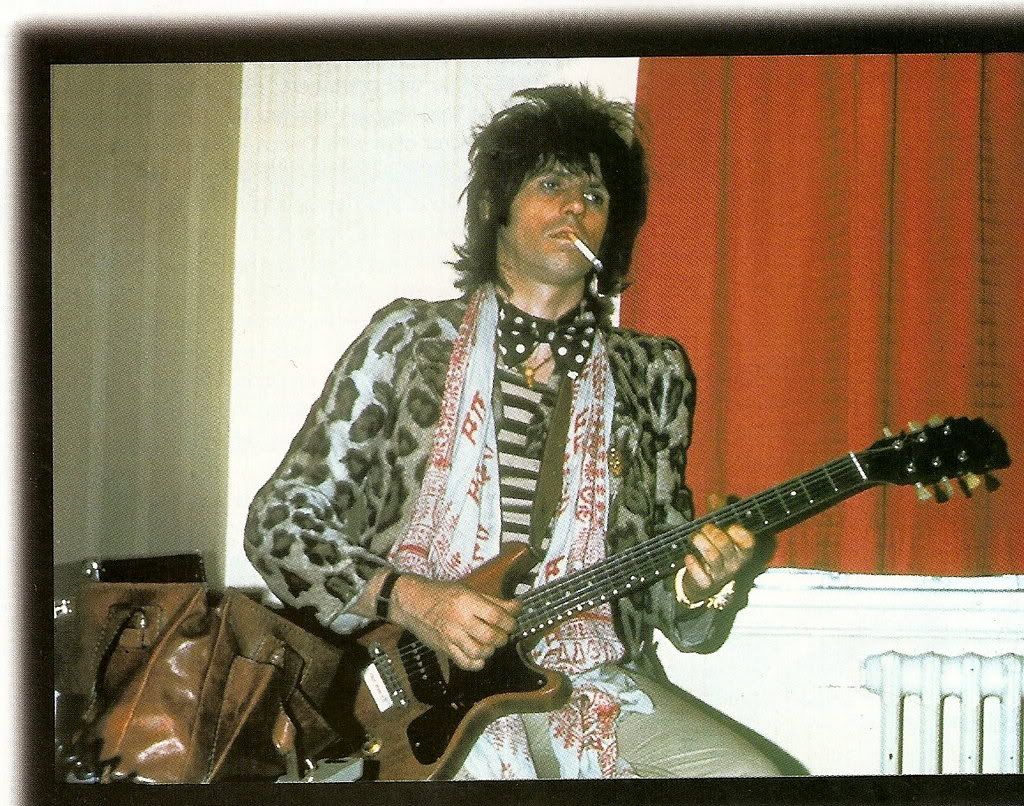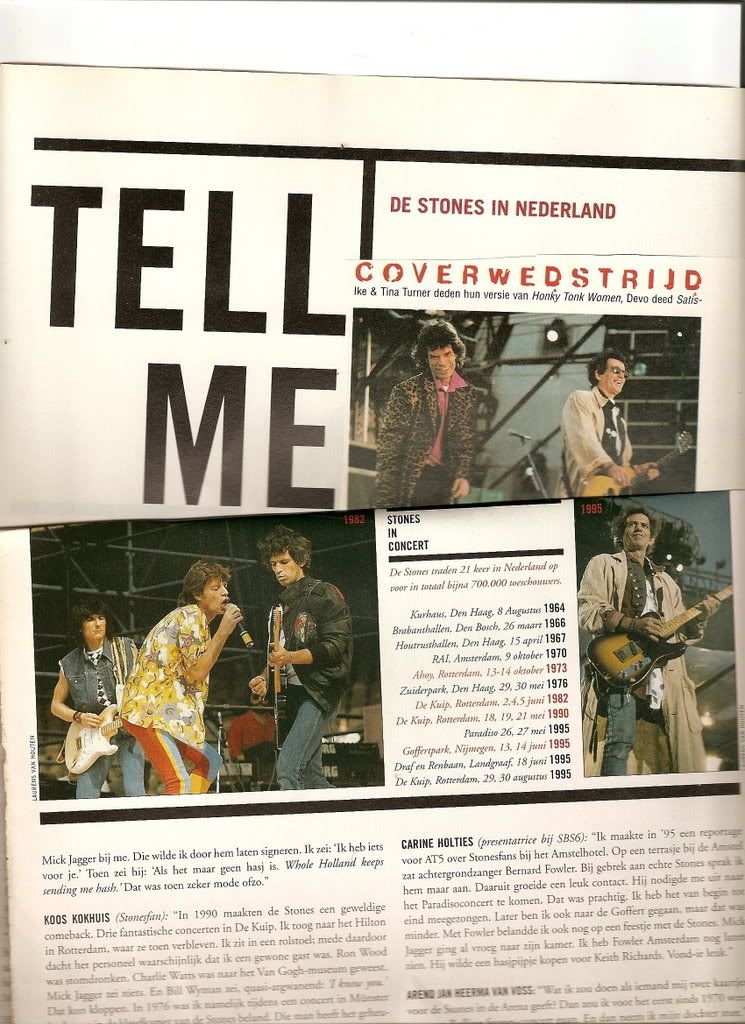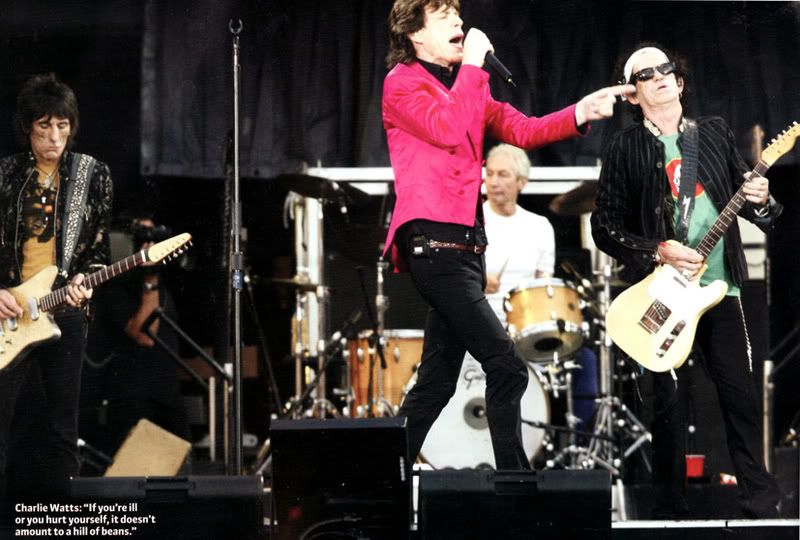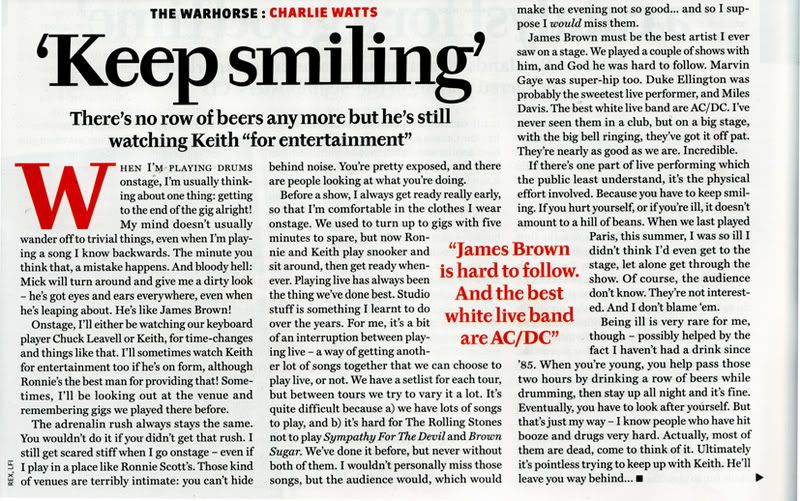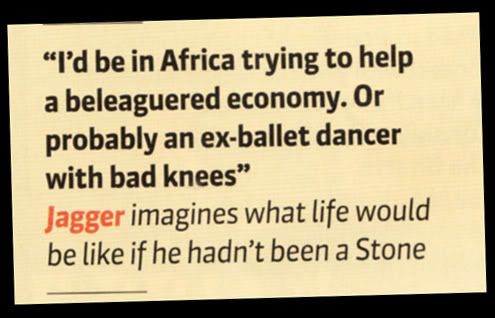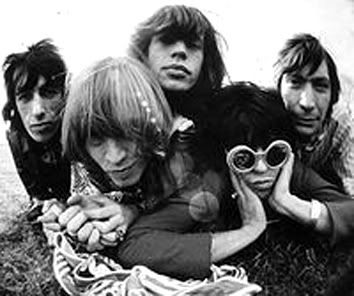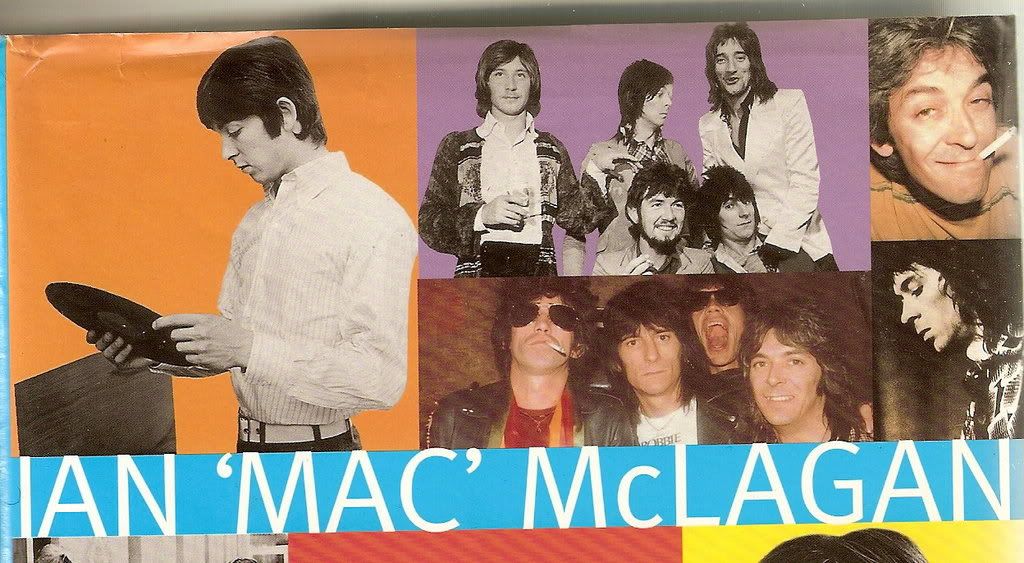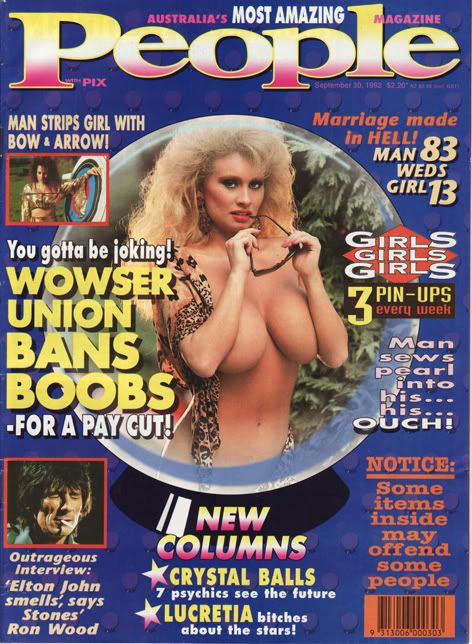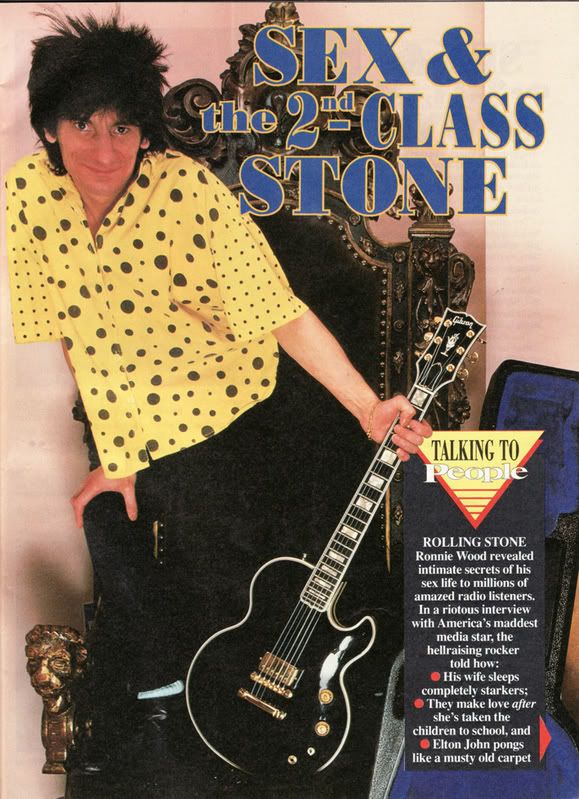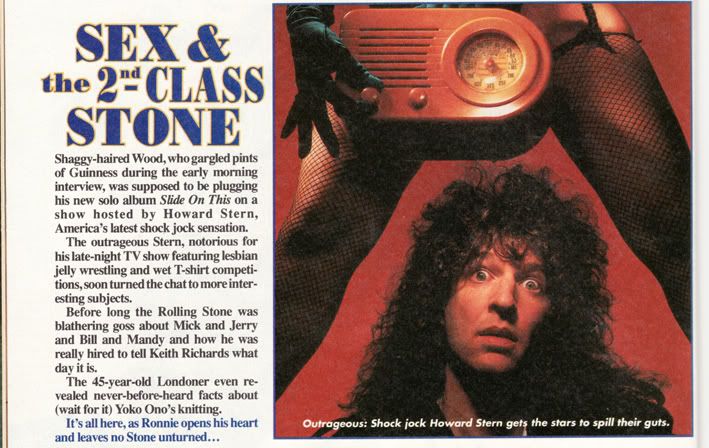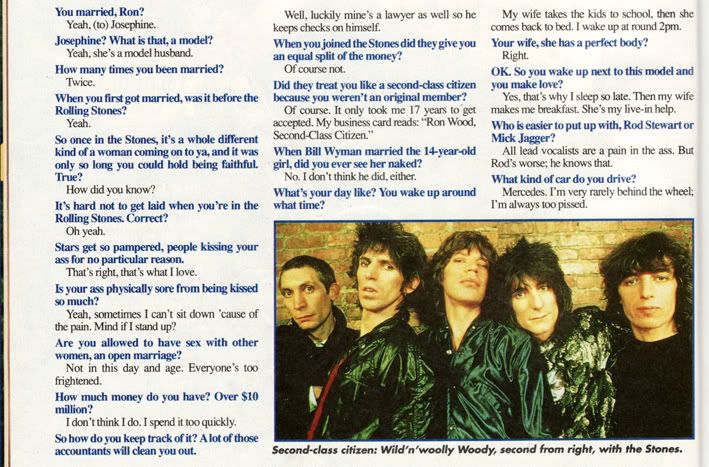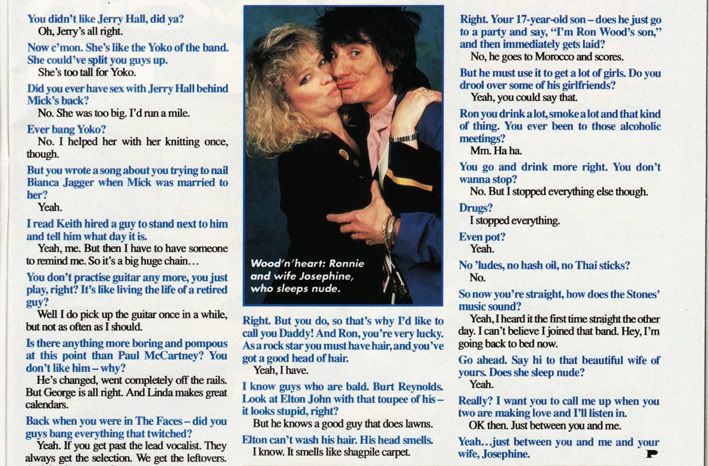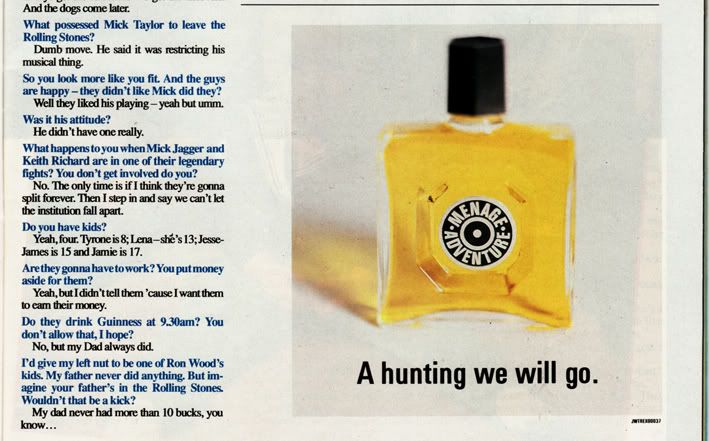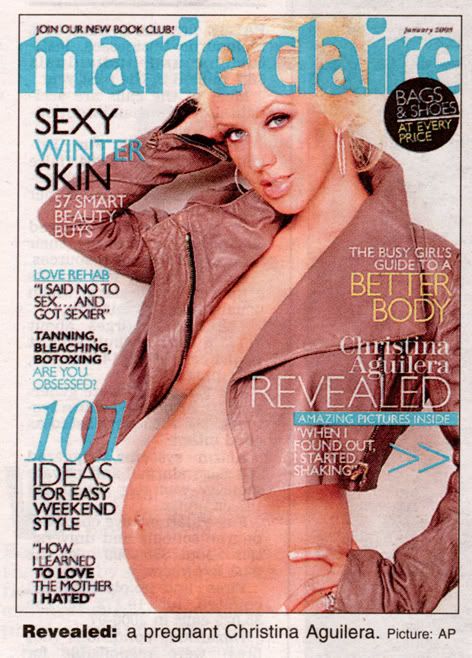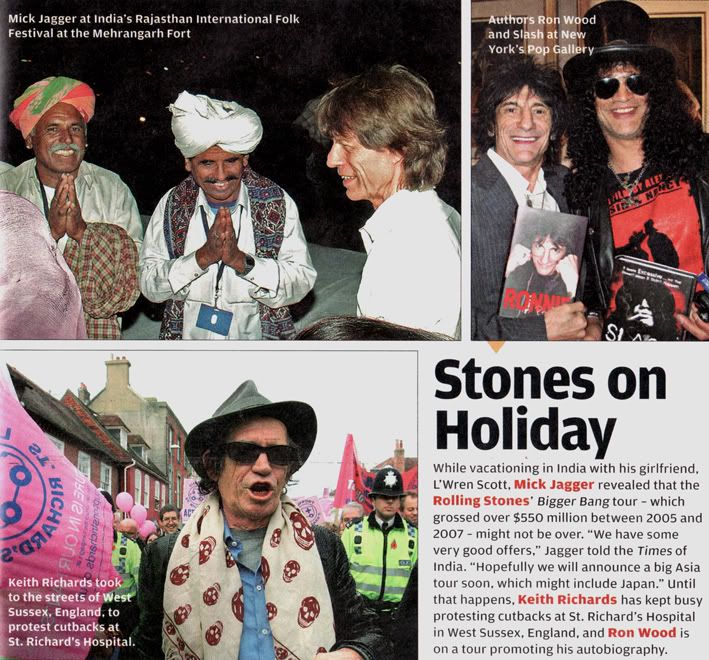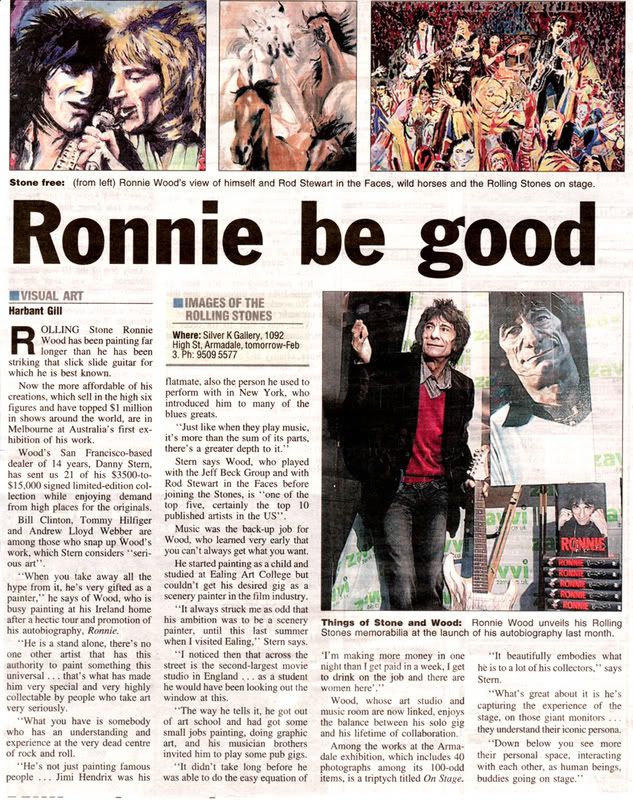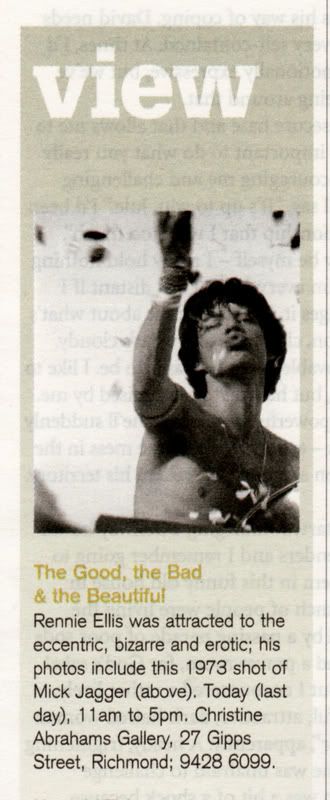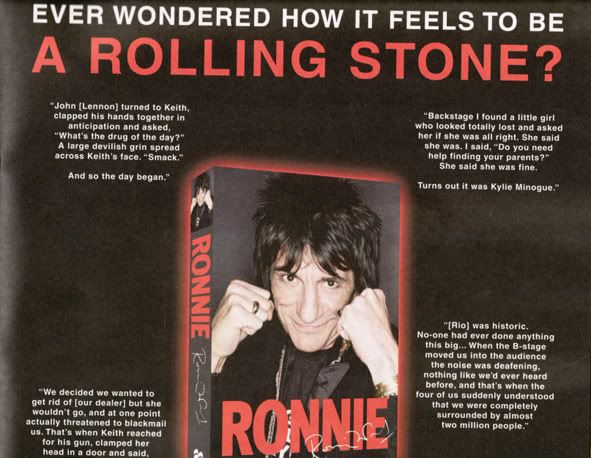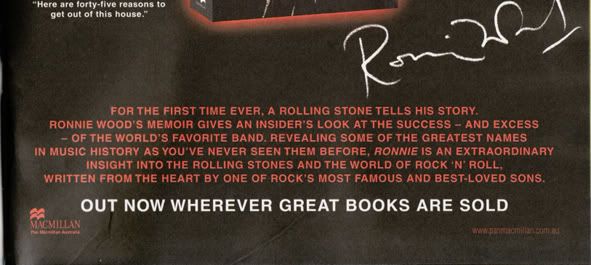Tell Me :
Talk
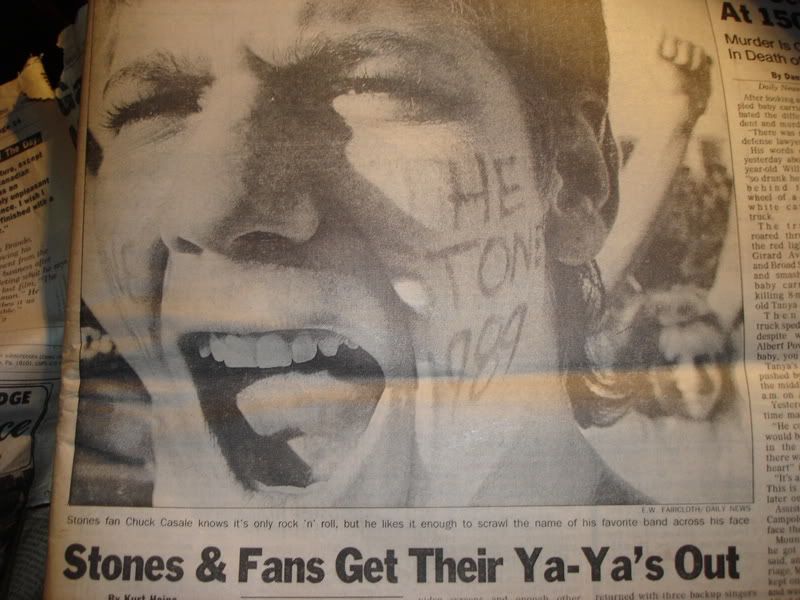
Da Steel Wheels Express
All Aboard
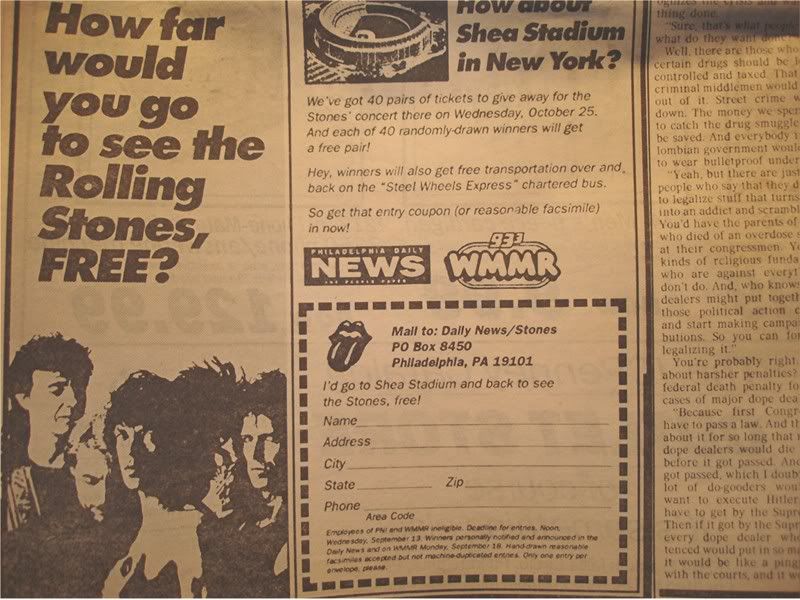

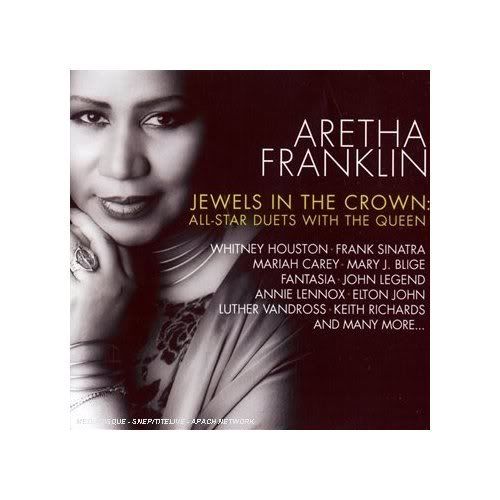
Compilation out since middle of November with Keith on JJF
Talk about your favorite band.
For information about how to use this forum please check out forum help and policies.
Re: Some Kinda Stones Connections
Posted by:
rooster
()
Date: November 18, 2007 12:45
Good to see you back brother!!
Re: Some Kinda Stones Connections
Posted by:
rooster
()
Date: November 18, 2007 13:28
present foo the rockman!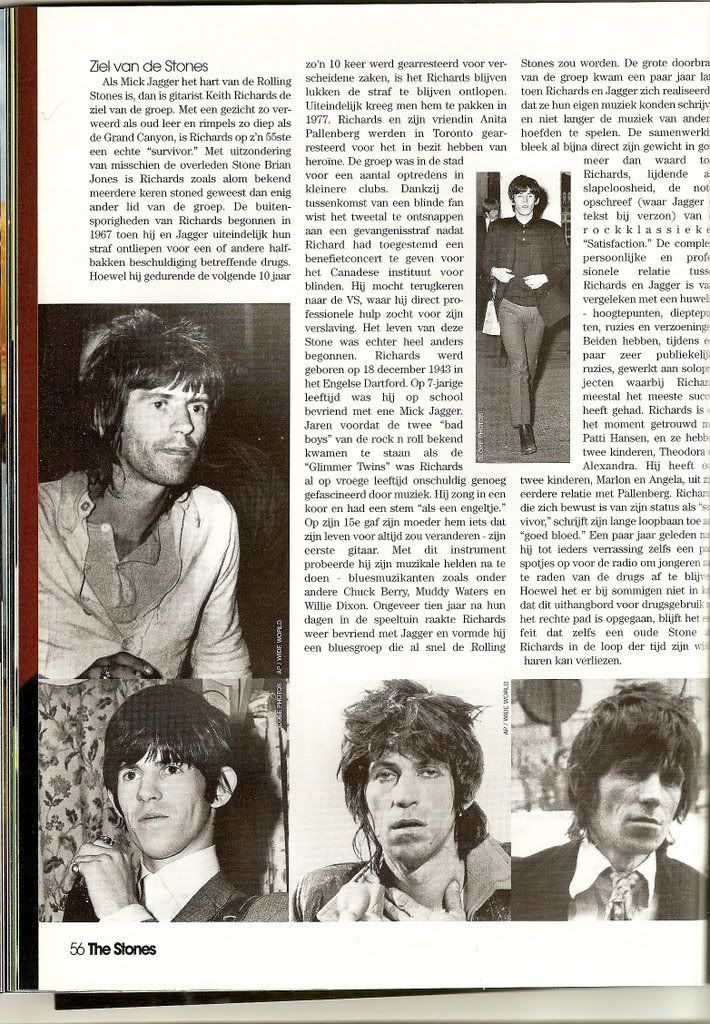

Re: Some Kinda Stones Connections
Posted by:
rooster
()
Date: November 20, 2007 09:46
morning this one is for the Rock!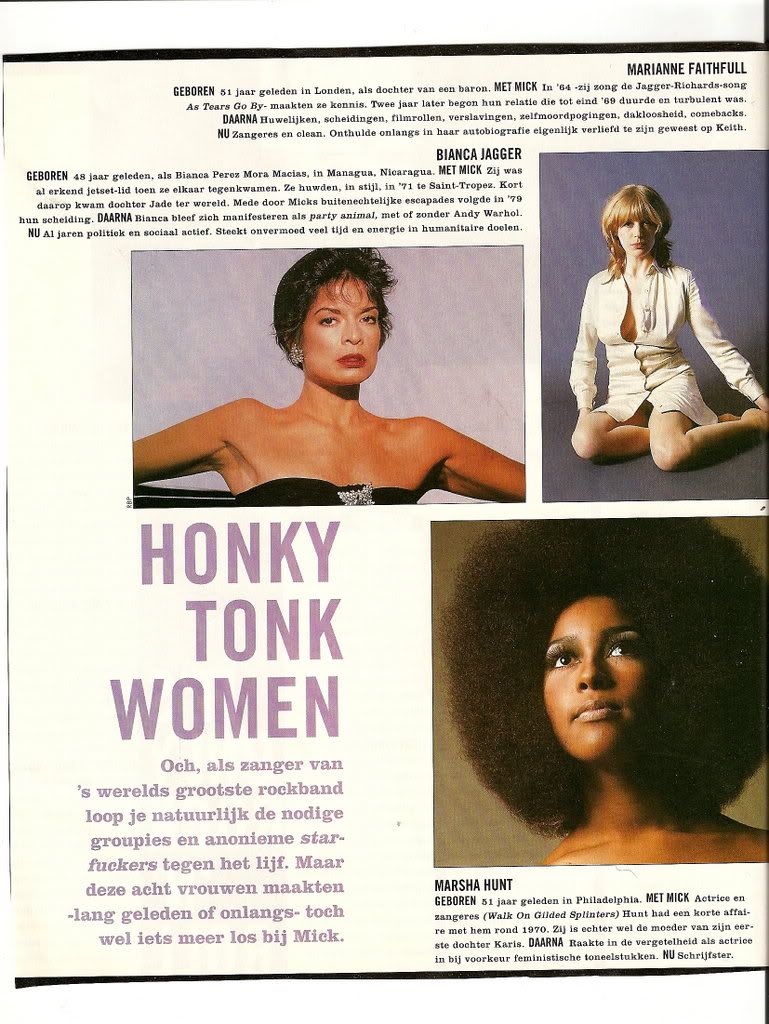

Re: Some Kinda Stones Connections
Posted by:
His Majesty
()
Date: November 20, 2007 14:56
Blind Faith - Olympic Sound Studios - spring/summer 1969


Re: Some Kinda Stones Connections
Posted by:
SomeTorontoGirl
()
Date: November 25, 2007 07:01
David Brooks: Fragmentation has ruined pop music
08:50 AM CST on Saturday, November 24, 2007
On Feb. 9, 1964, the Beatles played on The Ed Sullivan Show. As Steven Van Zandt remembers the moment: "It was the beginning of my life."
Mr. Van Zandt fell for the Beatles and discovered the blues and early rock music that inspired them. He played in a series of bands on the Jersey shore, and when a friend wanted to draw on his encyclopedic blues knowledge for a song called Tenth Avenue Freeze-Out, Mr. Van Zandt wound up as a guitarist for Bruce Springsteen and the E Street Band.
The 1970s were a great moment for musical integration. Artists like the Rolling Stones and Bruce Springsteen drew on a range of musical influences and produced songs that might be country-influenced, soul-influenced, blues-influenced or a combination of all three. These mega-groups attracted gigantic followings and can still fill huge arenas.
But cultural history has pivot moments, and at some point toward the end of the 1970s or the early 1980s, the era of integration gave way to the era of fragmentation. There are now dozens of niche musical genres where there used to be this thing called rock. There are many bands that can fill 5,000-seat theaters, but there are almost no new groups with the broad following or longevity of the Rolling Stones, Bruce or U2.
People have been writing about the fragmentation of American music for decades. Back in the Feb. 18, 1982, issue of Time, Jay Cocks wrote that American music was in splinters. But year after year, the segmentation builds.
Last month, for example, Sasha Frere-Jones wrote an essay in The New Yorker noting that indie rock is now almost completely white, lacking even the motifs of African-American popular music. Carl Wilson countered in Slate that indie rock's real wall is social; it's the genre for the liberal-arts-college upper-middle class.
Technology drives some of the fragmentation. Computers allow musicians to produce a broader range of sounds. Top 40 radio no longer serves as the gateway for the listening public. Music industry executives can use market research to divide consumers into narrower and narrower slices.
But other causes flow from the temper of the times. It's considered inappropriate or even immoral for white musicians to appropriate African-American styles. And there's the rise of the mass educated class.
People who have built up cultural capital and pride themselves on their superior discernment are naturally going to cultivate ever more obscure musical tastes. I'm not sure they enjoy music more than the throngs who sat around listening to Led Zeppelin, but they can certainly feel more individualistic and special.
Mr. Van Zandt argues that if the Rolling Stones came along now, they wouldn't be able to get mass airtime because there is no broadcast vehicle for all-purpose rock. And he says that most young musicians don't know the roots and traditions of their music. They don't have broad musical vocabularies to draw on when they are writing songs.
As a result, much of their music (and here I'm bowdlerizing his language) stinks.
He describes a musical culture that has lost touch with its common roots. Yet he has a way to counter this. He's drawn up a high school music curriculum that tells American history through music. It would introduce students to Muddy Waters, the Mississippi Sheiks, Bob Dylan and the Allman Brothers. He's trying to use music to motivate and engage students, but most of all, he is trying to establish a canon, a common tradition that reminds students that they are inheritors of a long conversation.
And Mr. Van Zandt is doing something that is going to be increasingly necessary for foundations and civic groups. We live in an age in which the technological and commercial momentum drives fragmentation. It's going to be necessary to set up countervailing forces – institutions that span social, class and ethnic lines.
Music used to do this. Not so much anymore.
David Brooks is a columnist at The New York Times.
[www.dallasnews.com]
08:50 AM CST on Saturday, November 24, 2007
On Feb. 9, 1964, the Beatles played on The Ed Sullivan Show. As Steven Van Zandt remembers the moment: "It was the beginning of my life."
Mr. Van Zandt fell for the Beatles and discovered the blues and early rock music that inspired them. He played in a series of bands on the Jersey shore, and when a friend wanted to draw on his encyclopedic blues knowledge for a song called Tenth Avenue Freeze-Out, Mr. Van Zandt wound up as a guitarist for Bruce Springsteen and the E Street Band.
The 1970s were a great moment for musical integration. Artists like the Rolling Stones and Bruce Springsteen drew on a range of musical influences and produced songs that might be country-influenced, soul-influenced, blues-influenced or a combination of all three. These mega-groups attracted gigantic followings and can still fill huge arenas.
But cultural history has pivot moments, and at some point toward the end of the 1970s or the early 1980s, the era of integration gave way to the era of fragmentation. There are now dozens of niche musical genres where there used to be this thing called rock. There are many bands that can fill 5,000-seat theaters, but there are almost no new groups with the broad following or longevity of the Rolling Stones, Bruce or U2.
People have been writing about the fragmentation of American music for decades. Back in the Feb. 18, 1982, issue of Time, Jay Cocks wrote that American music was in splinters. But year after year, the segmentation builds.
Last month, for example, Sasha Frere-Jones wrote an essay in The New Yorker noting that indie rock is now almost completely white, lacking even the motifs of African-American popular music. Carl Wilson countered in Slate that indie rock's real wall is social; it's the genre for the liberal-arts-college upper-middle class.
Technology drives some of the fragmentation. Computers allow musicians to produce a broader range of sounds. Top 40 radio no longer serves as the gateway for the listening public. Music industry executives can use market research to divide consumers into narrower and narrower slices.
But other causes flow from the temper of the times. It's considered inappropriate or even immoral for white musicians to appropriate African-American styles. And there's the rise of the mass educated class.
People who have built up cultural capital and pride themselves on their superior discernment are naturally going to cultivate ever more obscure musical tastes. I'm not sure they enjoy music more than the throngs who sat around listening to Led Zeppelin, but they can certainly feel more individualistic and special.
Mr. Van Zandt argues that if the Rolling Stones came along now, they wouldn't be able to get mass airtime because there is no broadcast vehicle for all-purpose rock. And he says that most young musicians don't know the roots and traditions of their music. They don't have broad musical vocabularies to draw on when they are writing songs.
As a result, much of their music (and here I'm bowdlerizing his language) stinks.
He describes a musical culture that has lost touch with its common roots. Yet he has a way to counter this. He's drawn up a high school music curriculum that tells American history through music. It would introduce students to Muddy Waters, the Mississippi Sheiks, Bob Dylan and the Allman Brothers. He's trying to use music to motivate and engage students, but most of all, he is trying to establish a canon, a common tradition that reminds students that they are inheritors of a long conversation.
And Mr. Van Zandt is doing something that is going to be increasingly necessary for foundations and civic groups. We live in an age in which the technological and commercial momentum drives fragmentation. It's going to be necessary to set up countervailing forces – institutions that span social, class and ethnic lines.
Music used to do this. Not so much anymore.
David Brooks is a columnist at The New York Times.
[www.dallasnews.com]
Re: Some Kinda Stones Connections
Posted by:
SomeTorontoGirl
()
Date: November 25, 2007 07:04
Former Rolling Stones Publicist Paul Wasserman Dies
Contributed by: Jason Gregory
Source: gigwise
Posted On: Wednesday, November 21, 2007 09:43 MST
Infamous rock publicist Paul Wasserman, who has worked with the Rolling Stones, has died of respiratory failure.
Wasserman – also known as ‘Wasso’ – had also worked with Bob Dylan and The Who during his illustrious career.
Music critic Robert Hilburn told the Los Angeles Times that Wasserman was “the most important rock publicist in town.”
"He was a brilliant media strategist who helped usher rock and roll into an era of new respectability."
He added: “Rock and roll was this rowdy kind of thing, and he was somehow able to make the mainstream press more interested."
Despite his famous clients, Wasserman ended his career in 2000 after it emerged that he had tried to sell shares in investment projects that he claimed were backed by celebrities.
He was sentenced to six months in jail and ordered to pay restitution, reports the BBC.
[www.hiphop-elements.com]
Contributed by: Jason Gregory
Source: gigwise
Posted On: Wednesday, November 21, 2007 09:43 MST
Infamous rock publicist Paul Wasserman, who has worked with the Rolling Stones, has died of respiratory failure.
Wasserman – also known as ‘Wasso’ – had also worked with Bob Dylan and The Who during his illustrious career.
Music critic Robert Hilburn told the Los Angeles Times that Wasserman was “the most important rock publicist in town.”
"He was a brilliant media strategist who helped usher rock and roll into an era of new respectability."
He added: “Rock and roll was this rowdy kind of thing, and he was somehow able to make the mainstream press more interested."
Despite his famous clients, Wasserman ended his career in 2000 after it emerged that he had tried to sell shares in investment projects that he claimed were backed by celebrities.
He was sentenced to six months in jail and ordered to pay restitution, reports the BBC.
[www.hiphop-elements.com]
Re: Some Kinda Stones Connections
Posted by:
SomeTorontoGirl
()
Date: November 25, 2007 07:14
Green of blues
MUSIC, MYTHS AND LEGENDS
By MARTIN VENGADESAN
Peter Green led a fantastic Fleetwood Mac before a drug habit ended it all for him.
CONSIDERING that the man founded the multi-platinum act Fleetwood Mac, and wrote two of the greatest rock singles of all time – Black Magic Woman (popularised, of course, by Santana) and Albatross (a massive-selling sublime instrumental) – it’s rather sad that I have to explain who Peter Green is. But his story is worth telling, to be sure!
Born into a Jewish family (his original name is Peter Greenbaum!), Green was present during the mid-1960s British blues boom. This was a time when The Yardbirds and The Rolling Stones took the lead from blues outfits led by Alexis Korner and John Mayall to shake up the scene, often on the back of revved-up covers of Chicago blues masters like Muddy Waters and Howling Wolf.
Green was a fan of John Mayall’s Bluesbreakers and when Eric Clapton left to form Cream, Green nagged Mayall to let him try out. His persistence paid off ... Mayall said he just wanted to shut Green up and had no idea how good he was!
Clapton’s might have been huge shoes to fill, but Green did so with aplomb ... his playing on his debut with the Bluesbreakers, A Hard Road (1967), was top-notch, and his sparse style, influenced by the likes of B.B. King, was a lesson in good taste for guitarists who overdid the chops.
Mayall was a generous boss and A Hard Road featured Green compositions like The Same Way (on which Peter sang) and the smoking instrumental The Supernatural. Furthermore, for Green’s birthday he gave him some free studio time!
This backfired because Green used that time to record with the Bluesbreakers’ new rhythm section of bassist John McVie and drummer Mick Fleetwood. So pleased was he with the recordings that the brash young Green decided to form a new group with Fleetwood (McVie was initially reluctant), thus leaving Mayall high and dry.
Along with blues enthusiast singer/guitarist Jeremy Spencer, Green put together a blues group called Fleetwood Mac. Yes, I know it’s a far cry from the famous Mac of Rumours (1977) and Tango in the Night (1987), but bear with me.
Fleetwood Mac in the late 1960s (from left): Jeremy Spencer, John McVie, Danny Kirwan, Peter Green and Mick Fleetwood (seated).
Back in 1967, Peter Green’s Fleetwood Mac was built on a repertoire that centred around tasteful interpretations (Little Willie John’s Need Your Love So Bad was given a glorious string arrangement and showcased Green’s underrated power as an emotional vocalist, while Spencer indulged his Elmore James fascination to the max). But the debut album, which rocketed into the UK Top 5, also contained the Green-penned Long Grey Mare and The World Keep on Turning.
From then on the Mac went into overdrive. Touring success in the United States brought a whole new audience, and a stylistic change for the dreamy instrumental Albatross brought a No.1 single. In fact, in 1969, Green’s band was outselling groups like The Beatles and The Rolling Stones!
However, all was not well behind the scenes, for Spencer’s reluctance to contribute original music and play on Green’s compositions led to the addition of teenage guitarist Danny Kirwan. As the band tried to grow beyond its original blues manifesto, its exposure to hippie culture and drugs that pervaded it was to eventually prove disastrous.
Still, the music got better and better. After a second album, Mr. Wonderful, highlighted by Green’s finest slow blues song Love That Burns, Green’s songwriting became inspired both by the excellent twin guitar lines he played with Kirwan (forget the Allman Brothers and Wishbone Ash, I think it started with Green and Kirwan!) and the frantic times he lived in.
It all came to a head in the late 1960s. By now the jeans-and-jacket working man Green was a bearded hippie in robes, and his songwriting was both visionary and troubling. His final full-length album with the Mac was the masterly Then Play On. It centred on the rocking epic Oh Well (providing a blueprint for adventurous guitarists) while the sheer melancholy of Closing My Eyes was offset by the sexy, grinding riffs of Rattlesnake Shake (ironically a song extolling the virtues of masturbation).
A pair of non-album hit singles, the desolate folk tune Man of the World and the intoxicating The Green Manalishi (and the Two-Pronged Clown), completed Green’s brilliant work during this period.
Unfortunately, in retrospect, the sheer power of The Green Manalishi lies in the fact that it chronicles the sound of Green’s own drug-fuelled breakdown. After over-exposure to LSD, he had a vision that his band should forgo monetary rewards and play to support causes such as children who were displaced by war.
He eventually broke down and was followed eerily by his proteges Spencer (who disappeared on tour to join a cult) and Kirwan (whose alcoholism led to a period of homelessness.) After a patchy solo career (highlighted by the free-form End of the Game), Green eventually rediscovered himself in the mid-1990s with the solid but safe Splinter Group.
By that time, however, McVie and Fleetwood had ridden a host of changes to lead a new group bearing the same name to superstardom. As great as Lindsey Buckingham, Christine McVie and Stevie Nicks are, they simply cannot match the original master when his star shone at its brightest.
Martin Vengadesan, a music lover and history buff, combines his two passions in his fortnightly column. If you have any interesting stories you want him to research, do drop him a line.
[www.star-ecentral.com]
MUSIC, MYTHS AND LEGENDS
By MARTIN VENGADESAN
Peter Green led a fantastic Fleetwood Mac before a drug habit ended it all for him.
CONSIDERING that the man founded the multi-platinum act Fleetwood Mac, and wrote two of the greatest rock singles of all time – Black Magic Woman (popularised, of course, by Santana) and Albatross (a massive-selling sublime instrumental) – it’s rather sad that I have to explain who Peter Green is. But his story is worth telling, to be sure!
Born into a Jewish family (his original name is Peter Greenbaum!), Green was present during the mid-1960s British blues boom. This was a time when The Yardbirds and The Rolling Stones took the lead from blues outfits led by Alexis Korner and John Mayall to shake up the scene, often on the back of revved-up covers of Chicago blues masters like Muddy Waters and Howling Wolf.
Green was a fan of John Mayall’s Bluesbreakers and when Eric Clapton left to form Cream, Green nagged Mayall to let him try out. His persistence paid off ... Mayall said he just wanted to shut Green up and had no idea how good he was!
Clapton’s might have been huge shoes to fill, but Green did so with aplomb ... his playing on his debut with the Bluesbreakers, A Hard Road (1967), was top-notch, and his sparse style, influenced by the likes of B.B. King, was a lesson in good taste for guitarists who overdid the chops.
Mayall was a generous boss and A Hard Road featured Green compositions like The Same Way (on which Peter sang) and the smoking instrumental The Supernatural. Furthermore, for Green’s birthday he gave him some free studio time!
This backfired because Green used that time to record with the Bluesbreakers’ new rhythm section of bassist John McVie and drummer Mick Fleetwood. So pleased was he with the recordings that the brash young Green decided to form a new group with Fleetwood (McVie was initially reluctant), thus leaving Mayall high and dry.
Along with blues enthusiast singer/guitarist Jeremy Spencer, Green put together a blues group called Fleetwood Mac. Yes, I know it’s a far cry from the famous Mac of Rumours (1977) and Tango in the Night (1987), but bear with me.
Fleetwood Mac in the late 1960s (from left): Jeremy Spencer, John McVie, Danny Kirwan, Peter Green and Mick Fleetwood (seated).
Back in 1967, Peter Green’s Fleetwood Mac was built on a repertoire that centred around tasteful interpretations (Little Willie John’s Need Your Love So Bad was given a glorious string arrangement and showcased Green’s underrated power as an emotional vocalist, while Spencer indulged his Elmore James fascination to the max). But the debut album, which rocketed into the UK Top 5, also contained the Green-penned Long Grey Mare and The World Keep on Turning.
From then on the Mac went into overdrive. Touring success in the United States brought a whole new audience, and a stylistic change for the dreamy instrumental Albatross brought a No.1 single. In fact, in 1969, Green’s band was outselling groups like The Beatles and The Rolling Stones!
However, all was not well behind the scenes, for Spencer’s reluctance to contribute original music and play on Green’s compositions led to the addition of teenage guitarist Danny Kirwan. As the band tried to grow beyond its original blues manifesto, its exposure to hippie culture and drugs that pervaded it was to eventually prove disastrous.
Still, the music got better and better. After a second album, Mr. Wonderful, highlighted by Green’s finest slow blues song Love That Burns, Green’s songwriting became inspired both by the excellent twin guitar lines he played with Kirwan (forget the Allman Brothers and Wishbone Ash, I think it started with Green and Kirwan!) and the frantic times he lived in.
It all came to a head in the late 1960s. By now the jeans-and-jacket working man Green was a bearded hippie in robes, and his songwriting was both visionary and troubling. His final full-length album with the Mac was the masterly Then Play On. It centred on the rocking epic Oh Well (providing a blueprint for adventurous guitarists) while the sheer melancholy of Closing My Eyes was offset by the sexy, grinding riffs of Rattlesnake Shake (ironically a song extolling the virtues of masturbation).
A pair of non-album hit singles, the desolate folk tune Man of the World and the intoxicating The Green Manalishi (and the Two-Pronged Clown), completed Green’s brilliant work during this period.
Unfortunately, in retrospect, the sheer power of The Green Manalishi lies in the fact that it chronicles the sound of Green’s own drug-fuelled breakdown. After over-exposure to LSD, he had a vision that his band should forgo monetary rewards and play to support causes such as children who were displaced by war.
He eventually broke down and was followed eerily by his proteges Spencer (who disappeared on tour to join a cult) and Kirwan (whose alcoholism led to a period of homelessness.) After a patchy solo career (highlighted by the free-form End of the Game), Green eventually rediscovered himself in the mid-1990s with the solid but safe Splinter Group.
By that time, however, McVie and Fleetwood had ridden a host of changes to lead a new group bearing the same name to superstardom. As great as Lindsey Buckingham, Christine McVie and Stevie Nicks are, they simply cannot match the original master when his star shone at its brightest.
Martin Vengadesan, a music lover and history buff, combines his two passions in his fortnightly column. If you have any interesting stories you want him to research, do drop him a line.
[www.star-ecentral.com]
Re: Some Kinda Stones Connections
Posted by:
SomeTorontoGirl
()
Date: November 25, 2007 07:40
Pas de problem, Rocker...


Re: Some Kinda Stones Connections
Posted by:
rooster
()
Date: November 25, 2007 09:11
Thanks for that charlie Watts interview
Re: Some Kinda Stones Connections
Posted by:
chippy
()
Date: November 30, 2007 00:45

Da Steel Wheels Express
All Aboard


Re: Some Kinda Stones Connections
Posted by:
rooster
()
Date: November 30, 2007 11:00
Thanks for tht Ronnie interview Rockman!!....Chippy have you found the Bianca Jagger interview?? greetings from cold holland!
Re: Some Kinda Stones Connections
Posted by:
Rockman
()
Date: December 4, 2007 08:20
New Comp from Clydie King highlighting some of her
solo work for Imperial & Minit recordings...Clydie is best
known for her session work/backing vocals on The Rolling Stones
Exile On Main Street - Shine A Light - Tumbling Dice and for
such artists as Leon Russell...BB.King....Streisand...Humble Pie...Joe Cocker
and Bob Dylan with whom she went on to became romantically involved with.........
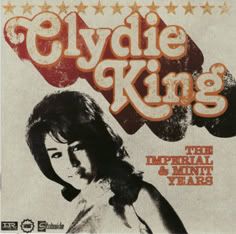
Clydie King - THE IMPERIAL & MINIT YEARS - EMI-5099950958122

ROCKMAN
solo work for Imperial & Minit recordings...Clydie is best
known for her session work/backing vocals on The Rolling Stones
Exile On Main Street - Shine A Light - Tumbling Dice and for
such artists as Leon Russell...BB.King....Streisand...Humble Pie...Joe Cocker
and Bob Dylan with whom she went on to became romantically involved with.........

Clydie King - THE IMPERIAL & MINIT YEARS - EMI-5099950958122

ROCKMAN
Re: Some Kinda Stones Connections
Posted by:
with sssoul
()
Date: December 4, 2007 20:56
here's a 2004 article about some of the Stones' offspring: [www.theage.com.au]
thanks to butlins1 on rs.com for the link
thanks to butlins1 on rs.com for the link
Re: Some Kinda Stones Connections
Posted by:
Sohoe
()
Date: December 5, 2007 21:42

Compilation out since middle of November with Keith on JJF
Re: Some Kinda Stones Connections
Posted by:
Rockman
()
Date: December 8, 2007 23:04
Any wonder old Ike was pissed....from a Rocket 88 to a Zephyr...!!!!
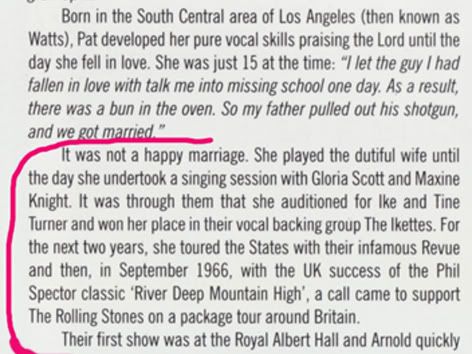
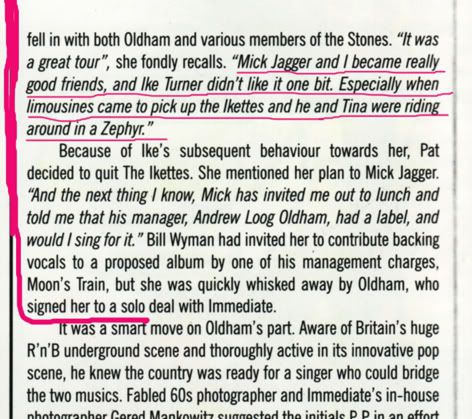
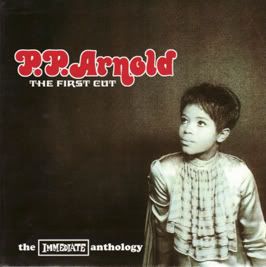
Taken from the liner notes of P.P. Arnold - The First Cut .....Immediate CMRCD233

ROCKMAN



Taken from the liner notes of P.P. Arnold - The First Cut .....Immediate CMRCD233

ROCKMAN
Sorry, only registered users may post in this forum.
Online Users
alfstone , bakersfield , fortilix , Handova , hockenheim95 , mickjagger1009 , novica , Stoneswolf , UGK56
Guests:
1879
Record Number of Users:
206
on June 1, 2022 23:50
Record Number of Guests:
9627
on January 2, 2024 23:10
